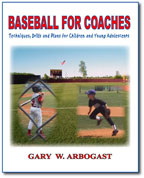 BASEBALL
FOR COACHES:
BASEBALL
FOR COACHES:
TECHNIQUES, DRILLS AND PLANS FOR CHILDREN AND YOUNG
ADOLESCENTS

by
GARY W. ARBOGAST
1st ed., 85 pgs, $13.95
ISBN 978-0-89641-432-7
Baseball
for Coaches: Techniques, Drills and Plans for Children and Young
Adolescents has been specifically written with the volunteer
youth league baseball coach in mind. The format will take the
volunteer coach from skill development and practice drills to
general practice plans for the entire season! The student is encouraged
to use a progressive, success oriented approach, with player development
and fun being the major emphases. If this is accomplished, winning
should begin to take care of itself. The objective of this book
is to provide the youth league coach with a resource that will
be used often to answer those coaching related questions that
often arise. Questions such as, should I teach sliding and what
is the best sliding technique to teach 8-12 year olds? Or, what
drills are available to improve the fielding of ground balls?
Or, if I have 14 days to practice during the summer, what should
I include and in what order?
Chapter 1
is called Teaching the Major Skills. This chapter describes suggested
techniques and mechanics of the basic baseball skills such as
throwing, catching, fielding, hitting, bunting, pitching, baserunning
and sliding. It will also remind the coach about useful feedback
that can be given to players when errors in skill performance
are made. Short teaching/learning cues are provided in brackets.
These cues can eventually be provided as corrective feedback that
athletes can easily remember.
Chapter 2
of this book is called Practice Drills. The drills included in
this book have all been tried by youth league coaches or have
been used with 8-12 year old youngsters at summer baseball camps
and are felt to be most appropriate for most youngsters within
this age group. In most cases, youth league programs anywhere
would not need special equipment or facilities to conduct practice
drills that follow. The practice drills in this book are presented
for each of the Major Skills from Chapter 1 including routines
described from the time before your team has access to the field
until the game begins.
Chapter 3
is called Planning the Seasonal Practice Schedule. This section
of the book was designed so the volunteer coach can offer youngsters
sequential and progressive practices. All of the practice drills
in Chapter 2 appear somewhere in the season plan. Much of the
"guess work" has been taken out of the planning process
by providing practice plans for the entire season.
Chapter 4
of this book is called General Hints for the Youth Sport Coach.
This chapter deals with several, easy-to-forget items that help
in the successful administration of a baseball season. These items
include facilities and equipment reminders, general hints for
conducting practice drills, and guidelines for conducting safe
practices. Finally, the Coaching Helpers that appear in Chapter
5 should provide youth league coaches with some options for record
keeping, player evaluation, and communicating with parents. The
appendices related to this chapter provide useful planning materials
and blank forms for you to copy and use.
CONTENTS
Chapter
1: TEACHING THE MAJOR SKILLS
Throwing
Receiving the Ball (Fielding)
Pitching
Types of Pitches
Batting
Bunting
Running Bases
Sliding
Tagging Up
Chapter
2: DRILLS
Warm-up/Fitness
Drills
Practice Drills
Pre-Game Routine
Chapter
3: THE SEASONAL PLAN
Introduction
and Description
Seasonal Practice Plan
Chapter
4: GENERAL HINTS FOR THE YOUTH LEAGUE COACH
Facilities
and Equipment
About Practice Drills
Guidelines for Conducting Safe Practice
Chapter
5: COACHING HELPERS
Roster:
Practice and Playing Record
Parent Letter
Checklist for Skills, Rules, Strategies
Baseball Skill Rating Chart
Baseball Skills Progress Report
Teaching/Learning Progressions
APPENDICES
A
Practice and Playing Record
B Parent Letter
C Checklist for Skills, Rules, Strategies
D Baseball Skills Rating Chart
E Baseball Skills Progress Chart
F Teaching/Learning Progressions for Basic Skills
Back
to the top
 BASEBALL
FOR COACHES:
BASEBALL
FOR COACHES: